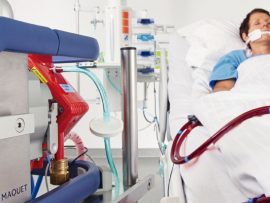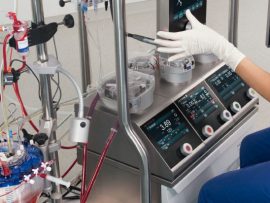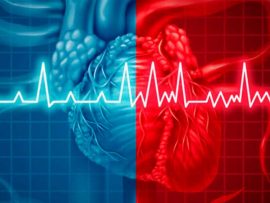Abstract The level of evidence of expert recommendations for starting extracorporeal cardiopulmonary resuscitation (ECPR) in refractory out-of-hospital cardiac arrest (OHCA) and in-hospital cardiac arrest (IHCA) is low. Therefore, we reported..
Read MoreAbstract Drugs intoxications often lead to severe vasoplegia and cardiogenic shock, and VA-ECMO represents a viable therapy option. However, as cardiopulmonary support is not contributing to the removal of the..
Read MoreAbstract Extracorporeal Membrane Oxygenation (ECMO) is commonly associated with a high blood transfusion requirement. Jehovah’s Witness patients present a particular challenge. The impossibility of transfusing blood cells and starting anticoagulation..
Read MoreAbstract The use of extracorporeal life support (ECLS) is increasingly reported in adult liver transplantation (LT). However, neither the role of ECLS in the perioperative setting for LT nor its..
Read MoreAbstract Objectives: Electronic cigarette or vaping product use–associated lung injury is a clinical entity that can lead to respiratory failure and death. Despite the severity of electronic cigarette or vaping product use–associated lung injury,..
Read MoreAbstract Neonates and children who have survived critical illness severe enough to require extracorporeal membrane oxygenation (ECMO) are at risk for neurologic insults, neurodevelopmental delays, worsening of underlying medical conditions,..
Read MoreThe Rotaflow II System is a reliable, high quality extracorporeal life support (ECLS) system that gives you the flexibility you need to provide quality patient care. As pioneers in the..
Read MoreAbstract Severely hypothermic patients, especially suffering cardiac arrest, require highly specialized treatment. The most common problems affecting the recognition and treatment seem to be awareness, logistics, and proper planning. In..
Read MoreAbstract Background has become accepted as a rescue therapy for cardiopulmonary shock, and there have been over 100,000 (ECMO) cases since 1987. Rapid growth has presented ethical challenges and concerns. Here, we discuss..
Read MoreAbstract In SARS-CoV-2 patients with severe acute respiratory distress syndrome (ARDS), Veno-Venous Extracorporeal Membrane Oxygenation (V-V ECMO) was shown to provide valuable treatment with reasonable survival in large multi-centre investigations...
Read MoreAbstract Extracorporeal membrane oxygenation (ECMO) support is indicated in patients who are refractory to treatment, those with cardiogenic shock or respiratory failure and those with exacerbations eligible for heart and..
Read MoreAbstract Objective Timing and causes of hospital mortality in adult patients undergoing veno-arterial extracorporeal membrane oxygenation (V-A ECMO) have been poorly described. Aim of the current review was to investigate..
Read MoreAbstract The use of venovenous extracorporeal membrane oxygenation (VV ECMO) among adults is rapidly increasing worldwide. By 2020, the Extracorporeal Life Support Organization (ELSO) Registry had recorded >24,000 cases of..
Read MoreAbstract Extracorporeal membrane oxygenation (ECMO) represents an established technique to provide temporary cardiac and/or pulmonary support. ECMO, in veno-venous, veno-arterial or in extracorporeal carbon dioxide removal modality, is associated with..
Read MoreAbstract CytoSorb is a promising tool to treat severe inflammatory status with multiple mechanisms in the acute care setting. Its effect on drugs is, however, poorly documented in vivo, although..
Read MoreAbstract The overwhelming success of cardiac surgery is closely related to the development and use of extracorporeal perfusion. After the first successful treatment of a stab wound to the heart..
Read MoreAbstract Abstract: The article reviews cannulation strategy for different modes of extracorporeal life support. Technical aspects, pitfalls and complications are discussed for central and peripheral extracorporeal membrane oxygenation (VA, VV,..
Read MoreAbstract Background To identify novel factors associated with the survival of septic adults receiving (ECMO) to improve patient selection and outcomes. Methods Cases were identified from our ECMO registry from 2001..
Read MoreAbstract OBJECTIVES No guidelines for mechanical circulatory support in patients with therapy-refractory cardiogenic shock and multiorgan failure including ongoing cardiopulmonary resuscitation (CPR) exist. To achieve immediate cardiopulmonary stabilization, we established..
Read MoreAbstract Background and Aim of the Study Extracorporeal life support (ECLS) may be necessary in refractory postcardiotomy cardiogenic shock (PCS) unresponsive to optimal medical treatment. We sought to analyze the..
Read MoreAbstract Extracorporeal life support (ECLS, also known as extracorporeal membrane oxygenation or ECMO) emerged in the 1970s as a potentially useful life-support therapy for refractory cardiac or respiratory failure in..
Read MoreAbstract Objectives To describe the incidence and outcomes of radiologically confirmed acute CNS complications in extracorporeal membrane oxygenation patients at an Australian extracorporeal membrane oxygenation referral center and identify associated..
Read MoreTrends From 2002 to 2017 Extracorporeal life support (ECLS) has grown in its application since its first clinical description in the 1970s. The technology has been used to support a..
Read MoreAbstract Veno-arterial extracorporeal membrane oxygenation (VA ECMO) is widely used in cardiogenic shock. It provides systemic perfusion, but left ventricular (LV) unloading is suboptimal. Using a closed-loop, real-time computer model..
Read MoreAbstract Survival from out-of-hospital cardiac arrest (OHCA) has remained low despite advances in resuscitation science. Hospital-based extra-corporeal cardiopulmonary resuscitation (ECPR) is a novel use of an established technology that provides..
Read MoreAbstract Extracorporeal membrane oxygenation (ECMO) has been used increasingly for both respiratory and cardiac failure in adult patients. Indications for ECMO use in cardiac failure include severe refractory cardiogenic shock,..
Read More



















